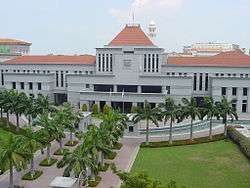Protection from Harassment Act (Singapore)
| Protection from Harassment Act 2014 | |
|---|---|
 | |
| An Act to protect persons against harassment and unlawful stalking and to create offences, and provide civil remedies related thereto or in relation to false statements of fact, and to make consequential amendments to other written laws. | |
| Enacted by | Parliament of Singapore |
| Date enacted | 13 March 2014 |
| Date assented to | 11 April 2014 |
| Date commenced | 15 November 2014 |
| Status: In force | |
The Protection from Harassment Act 2014 (PHA) is a statute of the Parliament of Singapore that criminalizes harassment, stalking, and other anti-social behaviour. The law is designed specifically to make acts of cyberbullying and online harassment a criminal offence.[1][2][3]
Overview
The Act abolished the common law tort of harassment, replaced by its statutory provisions.[4] It also replaced sections 13A to 13D of the Miscellaneous Offences (Public Order and Nuisance) Act, and expanded the scope to cover acts conducted online and increased the penalties to include imprisonment sentences.[1] The Act is intended to cover both intentional and unintentional harassment, and has extra-territorial jurisdiction for certain offences which include online acts by the defendant if the complainant was in Singapore at the time of the offence and the defendant knew or should have known of that fact.[5] The new law is also designed to be more accessible for the public than previous laws:[6] for instance provisions are now made for victims to apply a protection order against an offender, and in more extreme cases a separate expedited protection order can be applied for and issued immediately.[6]
A new offence of "unlawful stalking" was introduced under this Act.[7] In addition anyone who abuses any public servant and public service worker, including staff from the public transport industry, can be prosecuted under this Act and sentenced to imprisonment for up to a year and a fine.[8]
Uses of the Act
Within two months of the Act's commencement, 79 reports were filed for harassment and 13 protection orders applied for.[5] The first expedited protection order was reportedly issued in January 2015 to remove captions from two videos uploaded by the defendant.[5]
In February 2015, Singaporean blogger Xiaxue filed a protection order against online satirical group SMRT Ltd (Feedback).[9] About a month later, blogger and author Grace Tan filed a protection order against Xiaxue.[10]
In March 2015, former child actor Amos Yee was charged under section (4)(1) of the Act for uploading a video to YouTube which allegedly "contained remarks about Mr Lee Kuan Yew which was intended to be heard and seen by persons likely to be distressed" by the clip.[11] The remarks were also described as "insulting" in the wake of Lee's death.[12] However, this charge was dropped in April 2015.[13]
Recent cases include Singapore Civil Defence Force Lieutenant-Colonel Goh Wee Hong who was charged under PHA after unlawfully stalking a woman in August 2015. Goh can be fined up to $5,000 and jailed for up to 12 months.[14]
Also in May 2015, the Ministry of Defence obtained a protection order against The Online Citizen.[15] It was later, after legal arguments made by lawyers Choo Zhengxi and Eugene Thuraisingam, overturned by the Court of Appeal in January 2017, which ruled in a 2-1 judgment that the Government of Singapore is ineligible as a 'person' to apply for a protection order against any individual.[16]
The Ministry of Manpower (Singapore), National Trades Union Congress and Singapore National Employers Federation are at present the primary institutions in fighting and deterring workplace harassment.[17]
See also
Reference list
- 1 2 Neo, Chai Chin (14 March 2014). "Anti-harassment laws to fight 'social scourge'". Today (newspaper). Retrieved 7 April 2015.
- ↑ Kwara, Michelle (27 February 2014). "Proposed anti-harassment law to clamp down on cyber bullying in Singapore introduced in Parliament". Yahoo! News. Retrieved 7 April 2015.
- ↑ "Second Reading Speech by Minister for Law, K Shanmugam, on the Protection from Harassment Bill". Ministry of Law. Retrieved 7 April 2015.
- ↑ Julia Yeo and Wei Qi Jen. "Implications of Singapore's new Protection from Harassment Bill 2014". Lexology. Retrieved 7 April 2015.
- 1 2 3 Abu Baker, Jalelah (15 January 2015). "Protection from Harassment Act: 5 things you need to know about the landmark legislation". Straits Times. Retrieved 7 April 2015.
- 1 2 Spykerman, Spykerman (15 January 2015). "Quicker, easier ways to get legal recourse for harassment". News 5 Tonight. Channel NewsAsia. Retrieved 7 April 2015.
- ↑ Chan, Wing Cheong (2014). "The new offence of "Unlawful stalking" in Singapore" (PDF). Singapore Academy of Law. 26: 333–353. Retrieved 7 April 2015.
- ↑ Tan, Suan Tiu (7 April 2015). "Interpreting privacy laws a complex matter". Straits Times Forum. Retrieved 7 April 2015.
- ↑ Aripin, Nurul Azliah (6 February 2015). "Singapore blogger Xiaxue obtains protection order against SMRT Ltd (Feedback)". Yahoo! News. Retrieved 7 April 2015.
- ↑ Hwei, Liang (30 March 2015). "Blogger Grace Tan Files Protection Order Against Xiaxue, Calls For Action Against Cyberbullying". Vulcan Post. Yahoo! News. Retrieved 7 April 2015.
- ↑ Loke Kok Fai (31 March 2015). "YouTuber Amos Yee charged, bail set at S$20,000". Channel NewsAsia. Singapore. Retrieved 30 March 2015.
- ↑ Ng, Kelly (1 April 2015). "Teen behind video insulting Christians charged". Today. Singapore. Retrieved 1 April 2015.
- ↑ "Amos Yee back in jail after no one posts bail for him". Today. 30 April 2015. Retrieved 30 April 2015.
- ↑ Chong, Elena. "Ex-SCDF Lieutenant-Colonel charged with stalking woman". Retrieved 16 March 2016.
- ↑ "Court rules claims that MINDEF stole idea for mobile first-aid vehicle are false". Channel NewsAsia. 16 May 2015. Retrieved 16 May 2015.
- ↑ Lum, Selina (16 January 2017). "Rare split decision by apex court rules that Govt cannot invoke anti-harassment law against The Online Citizen website". Straits Times. Retrieved 16 January 2017.
- ↑ Ho, Olivia (24 Dec 2015). "'Onus on employers' to fight harassment". Straits Times.
